Where have all the new firms gone?

I’m a child of the 60s and a lawyer of the 80s. I grew up in a world where calculators didn’t exist, never mind word processors and computers. In the 80s, my traineeship was with a firm that had one of the first computers in a legal office in Scotland. It took up a whole room in the basement (and wasn’t that much more than a calculator and word processor). Mobile phones were still years away, and witness statements and notes on title were still written by hand.
I’m not one who hankers for “the good old days”, but there were a few things that were better back then, I think. One was that starting your own legal firm was something that was within the sight and ambitions of many young practitioners, including myself. Looking around the high street today, I see firms set up by my contemporaries, and can think of many that are no more through mergers and retirement. For several years, though, I have been asking myself, where have all the new firms gone?
There is no doubt that 2008 was at least partly to blame. In the post-recession world, law simply wasn’t a game worth playing. However, I’ve recently begun to see a few new names appearing, and thought it might be interesting to find out a little more about why they had set up and what their journey had been like. Are we seeing a new generation of legal dynasties in the making?
Why?
My first meeting was with Tim Weir of Weir Law, a niche private client firm. I asked Tim: “What made you decide to start up a practice on your own?” “It was an irresistible opportunity,” he replied, “a fear of the regret I might have if I didn’t try.” Likewise, Brian Rooney of Rooney Family Law answered: “It was a drive to do it for myself,” while Hannah Richmond of Richmond Clark said: “I just wanted to work for myself” and, perhaps more interestingly, “I saw the shop, liked the area and just went for it.”
Emma Hughes of Carey Hughes echoed the sentiment: “The opportunity arose and I looked at things that could be done better and the commercial benefits.” Almost universally, the individuals I spoke to showed what I would describe as an entrepreneurial spirit, that desire to make something happen for themselves. It wasn’t about money nor, by and large, dissatisfaction somewhere else.
Why not?
Next I asked: “What were your greatest fears before starting?” Greg Whyte of Jones Whyte was on point: “Fear of failure, but not much else.” That sentiment was echoed by most in some form. Weir added: “The reality was quite the opposite; concern focuses the mind.” Likewise, Hughes was sanguine: “I realised that if it didn’t work I could always get a job somewhere else.” From my own perspective I was perhaps surprised that the answers didn’t include fear of the regulatory burden, the changing market or the much-heralded “death of the high street”. Let me, though, come back to some of these points later. What was clear was that the concerns voiced were appropriate, but did not hold anyone back.
Challenges
On what had been their greatest challenges to date, for most the answers were along similar lines: balancing work and staff needs and bringing income up to levels previously enjoyed in employment. Of the firms that were kind enough to spare the time, Jones Whyte is certainly the biggest, having now reached 18 solicitors and more than 40 staff in total. Whyte gave me, I thought, the most interesting answer: “Maintaining the hunger.” Having myself run a business, I know that maintaining focus can be hard. The old adage “If you aren’t going forward, you are going back” is as true in law as anywhere, and maintaining that hunger to improve and grow not only keeps us relevant to our clients and their needs, but also keeps us engaged and interested in our business.
Highlights
For balance, my next question was: “What have been the highlights for you?” Again, an interesting mix of responses followed. For Richmond, it was “flexibility and seeing the business grow”; for Rooney, “seeing success and pride in seeing it working”; for Weir, “autonomy, freedom and winning new clients”; and for Whyte, “seeing people enjoying being part of the firm”. He added: “To a limited extent, the financial success.”
I think that is a point to note. Financial reward didn’t seem to be the main driver for any of these legal entrepreneurs. On my own journey and from all that I have read and researched, financial rewards are always the by-products of doing what you love well; never an end in themselves.
Red tape
Was the regulatory burden a worry? “No,” was the qualified response. Some had simply outsourced areas such as their cashroom to reduce that stress. Most had brought a good understanding of the issues from their previous firms. Weir summed it up: “Yes, before I started, but not so much now. It’s bureaucratic but understandable.”
I know for myself that the fear of regulation stopped me going out alone, preferring to partner with those with greater skills in those areas. In the modern world, though, so much can be outsourced and there are real opportunities at relatively low costs to be a “virtual” firm and have others take on many of the functions that a cashier or even office manager might have in previous times. Without prompting, Weir also mentioned that my own organisation, HM Connect, was for him exactly such a resource that he could use for non-core areas of work when required.
Any regrets?
When asked: “Would you do it again?”, the answer was simple: “Yes”. There was no sense from any that running a legal business had been a chore. Meeting solicitors across Scotland on a daily basis in my job, I get a sense that we are all under pressure and that some might prefer if their exit from the profession was a little closer or a little easier to reach. I wonder, though, if for some the excitement has simply gone. Perhaps creating and building something is what really makes us feel “engaged”? Was Whyte right to be afraid of losing that hunger? Is it the fact that some firms are so averse to change that makes them in part dissatisfied with their lot?
So I queried: “If you did it again, would you do anything differently?” Again, the answers were a fairly consistent “No”. Richmond added: “I couldn’t have done it any sooner”; similarly Weir. Rooney, interestingly, might have considered something other than a high street position for his office. I suspect for a new business like his it may be some time before the benefits of passing trade outweigh the additional costs of renting. It is also perhaps an indication that clients are finding us more online and the value of a high street presence might be diminishing. It’s a conversation that I’d like to revisit with him in a year or two.
What next?
When asked for a word to describe the whole experience, it was almost universally “rewarding”. And to “What next?”, the response was largely the same: “expansion”. Hughes added: “Focus on a happy team and excellent service”, and Whyte is now at the stage of looking at “futureproofing the business”. Again, there was little by way of negative feedback or regret about the path that any of these legal entrepreneurs have taken, and for them growth and engagement seem to be wired into the business.
Promoting risk – the good kind
What are my conclusions from these interviews? I should start by saying that pieces like these do have a tendency to reinforce one’s own opinions, and I very much believe that entrepreneurialism in the profession is important. The responses from all of those who kindly gave up their time seemed to support this. For them, setting up their own business was satisfying and exciting and inevitably financially rewarding. Their timelines varied, but all were five years established or less. Relatively short periods, yet some are already showing signs of real success. So why aren’t more doing it?
I’m perhaps fortunate in that I have engagement with the whole legal ecosystem, teaching on the Diploma and, through HM Connect, working with practitioners at every stage. For students, commercial awareness is now a core part of the Diploma and PEAT 2 training, and there is no doubt that as a profession, we are trying to raise awareness of law as a business. I think, though, that there needs to be still more done to develop entrepreneurial thinking both within existing practice units and with young solicitors.
A lot can be learned from the likes of Entrepreneurial Spark and other business accelerators that sprung up post-recession to help young businesses in Scotland grow. Legal Hackers and similar organisations are also exploring the boundaries between IT and law. I fear that with law graduates and young solicitors we focus so much on professional risk that they fail to grasp the difference between that and entrepreneurial risk. While one is to be avoided at all costs, the other can be managed and might possibly be welcomed.
It might also be a generational thing. Perhaps the “millennials” and “Gen Z” are simply more risk averse, or perhaps the changing gender makeup of the profession might play a part (although my experience has been to the contrary).
With more than 1,100 firms in Scotland, why do we even need new ones? Arguably we don’t, but existing firms can often be slow to change and adapt to new opportunities. New firms generally do not have the legacy issues that hold so many more established firms back. There are also new challenges in how we as a profession attract and retain clients, and new areas of law that need to be developed. Google, Amazon and Apple all began life as startups.
Like most of the pieces I write, I hope that I didn’t give you any answers, but perhaps some questions that need to be asked. As an employer, is your business keeping you and indeed your workforce not just busy but excited and engaged? For those of you wondering if you can do it for yourself, what is holding you back? I’ll leave this piece with a quote from one of those who, with my thanks, gave so freely of their time: “Go for it; life’s too short.”
In this issue
- Online and out of line
- Timing the test for detriment
- The power of conversation
- Making Scotland an ACE aware nation
- Reading for pleasure
- Opinion: Jane Mair
- Book reviews
- Profile: Amanda Davy
- President's column
- Round Scotland from A to Z
- People on the move
- When crime no longer pays
- Hold tight for Brexit
- Debt: finding the right formula
- The thick of it
- Fringe benefits boost conference appeal
- Private revolution
- Document Data Group Form Partnership with Law Pro
- Where have all the new firms gone?
- New specialist land registration practice launches
- Sentences in many guises
- Law firms: how to attract and retain the best talent
- Licensing Armageddon – again?
- Planning Bill changing shape
- HMRC called offside in referees case
- Powers of attorney: two essential practice points
- Better access to the law
- Finding the right blend
- Look out for AML certificate launch
- Public policy highlights
- Clients, care, competence and... cancer
- Practice rights and Brexit: working in the UK
- Claims of our age
- Ask Ash
- Paralegal pointers
- A sleep in the park






